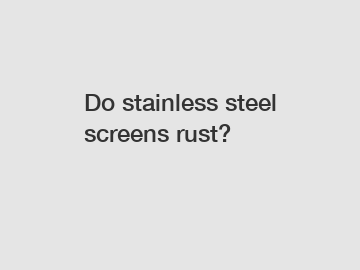Do stainless steel screens rust?
huanji wire mesh are exported all over the world and different industries with quality first. Our belief is to provide our customers with more and better high value-added products. Let's create a better future together.
Do stainless steel screens rust?
Yes, stainless steel screens can rust under certain conditions. Although stainless steel is known for its resistance to rust and corrosion, it is not completely immune to the effects of rusting.

The rusting of stainless steel screens occurs when the protective layer of chromium oxide on the surface of the steel is compromised. This can happen due to exposure to corrosive environments, such as saltwater or harsh chemicals, or from physical damage, such as scratches or cuts. When the protective layer is damaged, the underlying steel is exposed to oxygen and moisture, which can result in the formation of rust.
To prevent rusting of stainless steel screens, it is important to properly maintain and care for them. Regular cleaning with mild detergent and water can help remove dirt and contaminants that can contribute to rust formation. It is also recommended to rinse the screens thoroughly after cleaning to remove any residue that could cause corrosion.
When it comes to the selection of stainless steel screens, it is crucial to choose the right grade of stainless steel for the specific application. Different grades of stainless steel have varying levels of corrosion resistance. For instance, austenitic stainless steel, such as 304 or 316, is highly resistant to rust and is commonly used in marine environments. On the other hand, ferritic stainless steel, such as 430, has lower corrosion resistance and may be more susceptible to rusting.
Additionally, the design and construction of stainless steel screens can also impact their resistance to rust. Screens with welded joints or areas of mechanical stress are more prone to rusting. Therefore, it is important to choose screens with seamless construction and smooth surfaces to minimize the risk of rust formation.
The significance of understanding the potential for rusting in stainless steel screens lies in the importance of their performance and longevity. Rust can compromise the structural integrity and functionality of screens, leading to reduced efficiency in applications such as filtration, separation, or protection against insects. Rusting can also impact the aesthetic appeal of screens, especially in architectural or decorative installations.
In conclusion, stainless steel screens can rust under certain conditions. Understanding the factors that contribute to rust formation and taking appropriate measures to prevent it is crucial for maintaining the performance and durability of these screens. By selecting the right grade of stainless steel, practicing regular maintenance, and paying attention to design considerations, the risk of rusting can be minimized, ensuring the longevity and effectiveness of stainless steel screens in various applications.
If you want to learn more, please visit our website stainless wire mesh panels.



